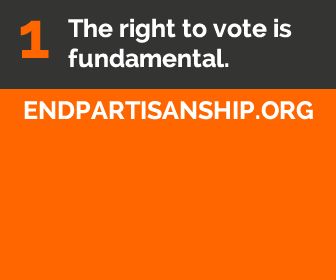Hawaii Democrats: Democracy Should be Limited to Partisan Voters

Since 1980, Hawaii has opened up its primary system to allow all voters, regardless of party affiliation, to vote. However, earlier this year, the Democratic Party of Hawaii (DPH) challenged the state law, asserting their First Amendment right of association:
“The lawsuit isn’t about excluding voters, but ensuring Democrats are selected at the primary stage by those willing to identify as Democrats.” - Dante Carpenter, chairman of the DPH.
In July, a Hawaii federal court ruled against the Democratic Party, upholding the current Hawaii open primary law:
“Secrecy of voting shall be preserved; provided that no person shall be required to declare a party preference or non-partisanship as a condition of voting in any primary or special primary election. Secrecy of voting and choice of political party affiliation or non-partisanship shall be preserved.”But now, the Democratic Party -- a party that prides itself on inclusiveness -- has re-asserted its right to prevent nonpartisan voters from participating at the most critical stage of the election process: the primary.
The legal constructs of the case are not as simple as a "parties have the right of private association" v. "voters have a right to participate" argument would suggest. The issues here are more complex, requiring factual and legal considerations that are either overlooked or not even considered by the traditional media.
According to one analysis, just 35 of next year's 435 congressional elections across the country will be "competitive." This means that in over 90% of congressional races, only the voters who participate in the majority parties' primary elections will have a meaningful vote because the candidate who wins that primary will de facto have won the entire race.
Beyond this gerrymandering problem, ballot access requirements, a public dialogue that revolves around Republican and Democratic primary winners, and a national electorate that self-identifies as independent more than either of the two major parties are all facts that we should consider.
However, the party's First Amendment right to keep unwanted voters out of its primary is a compelling one. But, isn't the right of any voter to participate in our democracy without being forced to join a party equally or more compelling? Should voters have to choose between their own right of non-association and the right to participate? When a private group's right conflicts with a fundamental right of an individual, whose right should trump whom?
Our democratic, republican, and libertarian ideals would suggest that when taxpayers fund something, the rights of the individual taxpayer or voter should trump the right of any private organization.
But, that is not the position of the Hawaii Democratic Party.
 Chad Peace
Chad Peace

